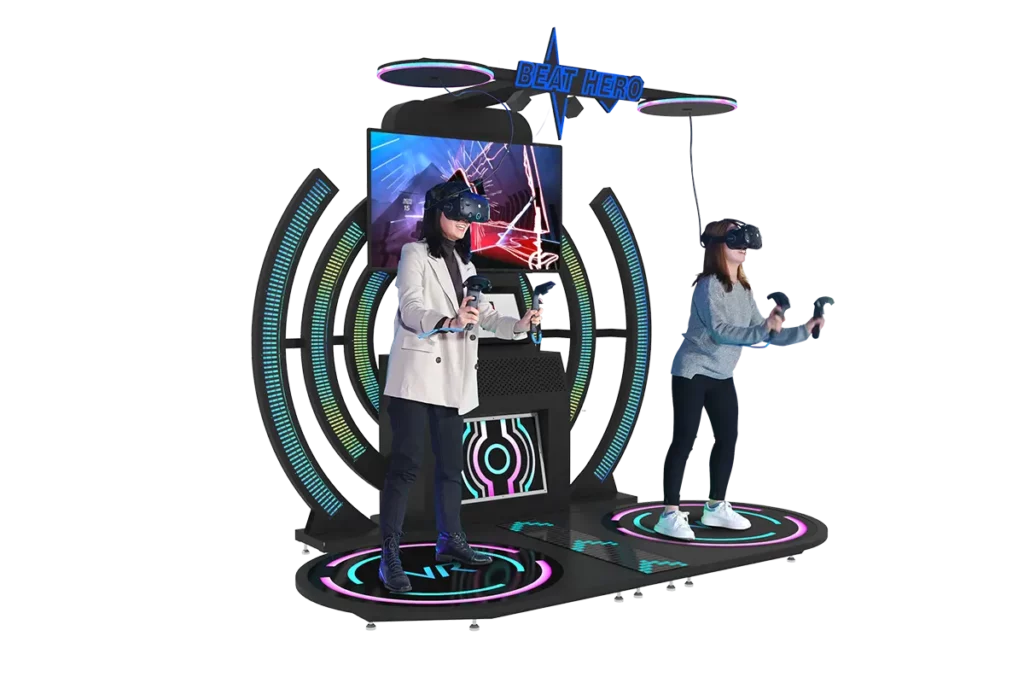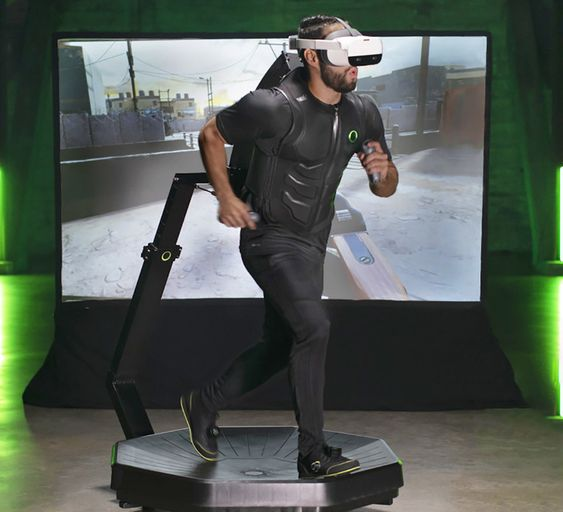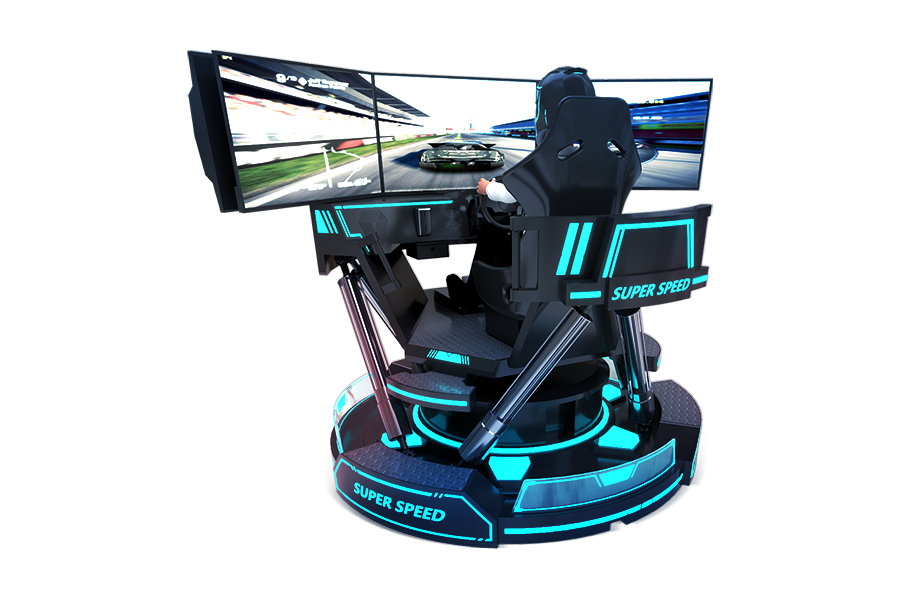
Source:Pinterest
Virtual reality (VR) is an ever-evolving technology that delivers captivating and engaging experiences in entertainment, education, and social interaction. By visiting VR arcades, individuals can indulge in various virtual games and simulations, all while utilizing cutting-edge gear like headsets, controllers, motion platforms, and tactile response devices. The remarkable capacity of VR arcades to draw in a wide array of people spanning various ages, hobbies, and cultures creates an exhilarating business prospect for visionaries eager to offer groundbreaking entertainment experiences.
If you’re considering launching your own VR arcade venture, this step-by-step guide will help you navigate the process of planning, establishing, and operating a successful VR arcade business.
What Does Your VR Venue Provide?

The first step in establishing a thriving VR venue is determining the virtual reality experiences you want to provide your customers. With a wide array of VR games and simulations available, from casual to hardcore, single-player to multiplayer, and realistic to fantastical, it’s crucial to consider your target audience, location, budget, and unique selling points.
Below are some popular categories of VR content to consider for your venue:
Adventure
Adventure games immerse players in various environments and scenarios, such as dungeons, jungles, and islands. These experiences often require puzzle-solving skills and physical movement, taking players on a thrilling journey.
Action
Action games are about fast-paced combat or sports, like shooting zombies, racing cars, or boxing opponents. These games often demand reflexes and coordination skills from players, providing an adrenaline-pumping experience.
Horror
Horror games evoke fear and suspense by exposing players to terrifying situations, such as haunted houses, dark forests, or alien invasions. Courage and endurance are critical skills for navigating these spine-chilling experiences.
Educational
Educational games offer interactive simulations for learning new skills or acquiring knowledge, such as flying planes, operating machinery, or exploring historical sites. These experiences often require curiosity and focus, providing a unique blend of entertainment and learning.
Social
Social games emphasize interaction with other players or characters within virtual worlds. Activities include chatting, dancing, or playing mini-games, often requiring communication and cooperation skills, fostering community and camaraderie.
To cater to your business goals and customer preferences, you can select one or more categories of VR content. Combining different types of content can help create a diverse and engaging portfolio, ensuring that your VR venue remains a popular destination for many users.
VR Arcade Machine Types and Games

The next step is choosing the type of VR arcade machines you want to use for your venue. Many kinds of VR arcade machines available in the market vary in size, shape, functionality, and price. Consider your space availability, cost efficiency, and customer satisfaction when choosing your VR arcade machines.
Virtual reality arcades offer a variety of immersive experiences through different types of VR machines. By catering to diverse customer preferences, users can engage with VR content in various ways using these machines:
Sitting VR Machines
These machines allow players to sit on chairs or couches while wearing headsets and holding controllers. Ideal for casual and relaxing games, sitting VR machines include:
- Movie Power VR Simulators: These simulators combine motion seats with 3D glasses and headphones to provide realistic simulations of various scenes, such as roller coasters, racing cars, and flying jets, for one or two players simultaneously.
- VR Roller Coaster Simulators: Simulating roller coaster rides, users wear 3D glasses and headphones while seated on a motion seat with seat belts and handles that vibrate and tilt according to their movements.
Riding VR Machines
With riding machines, players depend on vehicles or animals while wearing headsets and holding controllers. Suitable for exhilarating games requiring speed and balance, examples include:
- VR Motorbike Simulators: Users sit on a realistic model with pedals and handles, controlling their speed and direction while wearing 3D glasses and headphones and racing on various tracks and terrains.
Standing/Walking VR Machines
These machines enable players to stand or walk on platforms or treadmills while wearing headsets and holding controllers. Ideal for adventurous and immersive games requiring movement and exploration, examples include:
- VR Standing Platforms: Users stand on a platform with sensors tracking their movements and gestures while wearing 3D glasses and headphones, interacting with objects and characters in single-player or multiplayer games across genres like shooting, adventure, and sports.
- VR Cages: Consisting of a metal cage with sensors, users wear 3D glasses and headphones to interact with objects and characters in single-player or multiplayer games across genres like horror, action, and escape rooms.
- 9D Cinema: These machines provide immersive 9D movie experiences, combining 3D visuals with motion seats and environmental effects like wind, vibration, and smoke. The 9D cinema can accommodate up to six players at a time and provide them with a variety of movies to choose from. Examples of 9D cinema movies include Jurassic World, Avatar, and The Avengers.
Selecting one or more types of VR arcade machines based on space availability, cost-efficiency, and customer satisfaction can help create a unique and diverse experience for your visitors. Mixing different types of devices further enhances the overall entertainment value of your VR arcade.
What to Consider

Source:Pinterest
The final step in establishing a successful VR arcade business involves considering several crucial factors that can significantly influence its prosperity. These factors include:
Location & Space
Selecting an ideal location for your venue is critical. Aim for a site with high foot traffic, excellent visibility, and easy accessibility. Additionally, consider the size and layout of the space, ensuring that it can comfortably and safely accommodate both your VR arcade machines and your customers.
Cost & Budget
Accurately calculate the initial and ongoing costs associated with your venues, such as rent, utilities, equipment, maintenance, staff, and marketing. Establish a realistic budget that covers these expenses while allowing for profit generation. To minimize costs, consider purchasing used or refurbished equipment, negotiating discounts, or partnering with other businesses.
Safety Concerns
Prioritize the safety of your customers and staff by adhering to relevant regulations and standards for VR arcades. Provide proper training, supervision, and guidance for using VR equipment and participating in VR games. Additionally, secure adequate insurance, implement security measures, and develop emergency protocols in case of accidents or incidents.
Paying close attention to these essential aspects can create a solid foundation for a thriving VR arcade business.
Conclusion

Source: movie-power
Launching a VR arcade venue business can be a fulfilling and profitable endeavor when approached with careful planning and execution. By offering diverse VR experiences tailored to various customer preferences, you can attract and retain a loyal customer base who will share their positive experiences with others. Selecting the appropriate VR arcade machines, considering space availability, cost efficiency, and customer satisfaction, will help maximize your revenue potential and give you a competitive edge in the market.
It’s essential to consider critical factors such as location, budget, and safety to ensure your business’s seamless operation and growth. By selecting a prime location with high foot traffic and visibility, effectively managing costs, and adhering to safety regulations, you set your VR arcade venue up for success.
We hope this article has provided valuable insights and guidance for starting your VR arcade venue business. If you have any questions or require further assistance, please contact us. Best of luck with your exciting new venture!




